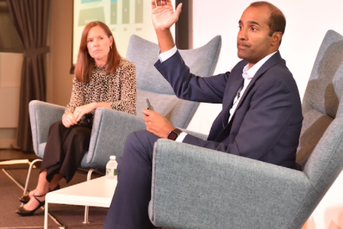Robinhood under pressure for bringing ‘gamification’ to investing

The free trading app has been applauded for democratizing the market but critics, and regulators, are starting to take a closer look
Robinhood was criticized this week for its use of gamification strategies to attract young investors in a complaint filed by the Massachusetts Securities Division that alleged the fintech manipulated its customers, many of whom are novice investors, into excessive trades.
The regulators defined gamification as the application of typical elements of game playing to other activities, typically as a marketing technique to boost engagement with a product or service.
Gamification strategies in the Robinhood app — like sending daily push notifications or displaying confetti raining down after each trade — are used to “lure customers” into consistent participation and long-term engagement with its trading platform which, in turn, generates more revenue for the app, according to the complaint.
A customer that has not yet traded in an account, for example, could receive a push notification from Robinhood with the message: “Top Movers: Choosing stocks is hard. [flexing bicep emoji] Get started by checking which stock prices are changing the most,” according to regulators. After clicking the notification, the customer is redirected to a “Top Movers” list that documents prices of popular stocks, according to the complaint.
Yet, gamification is a tried-and-true practice and Robinhood is far from the only company using similar tactics. Popular apps, like the fitness app Peloton, use gamification to capture their users’ attention and influence their behavior to keep them engaging with their products. Fintechs like Betterment, Wealthfront, Acorns and Stash use push-button notifications and similar techniques.
The problem is that Robinhood’s strategies encourage frequent trading, regulators say, which can lead to significant losses for investors. They also differ from those used by other digital apps that encourage seemingly beneficial habits like fitness, saving or financial planning, said Sophie Schmitt, senior analyst with the Aite Group.
“[Online banking apps] encourage healthy financial habits,” Schmitt said. “Online trading has the potential to set back young investors from achieving financial goals. And that likelihood expands if the app encourages frequent engagement, which can lead to quick decisions driven by emotions.”
Moreover, Robinhood’s tactics could be seen as addictive and manipulative, according to Daniel Simon, CEO of Vested. “Hacking human psychology to improve how we interface with products and services can be used for good and ill,” Simon said. “With any good user experience, companies can improve their products, making them simpler and easier to use, but can also manipulate their customers.”
OPENING UP MARKETS
To be fair, Robinhood has been applauded for democratizing the market for young investors through the use of a free mobile experience that has driven a new millennial client base to investing for the first time, according to Robert Norris, managing principal at Capco.
However, research has shown that millennials could suffer from massive overconfidence in investing, according to Norris. In fact, a TIAA study stated 62% of millennials assess their own financial knowledge as high or very high; however, only 19% of these respondents could answer the three financial literacy questions correctly.
While investing is not a game, the use of confetti or flashing lights to drive user engagement isn’t necessarily alarming, according to Will Trout, director of wealth management at Javelin Strategy & Research.
“Where I see a problem is knowingly leading people who can’t swim out to the deep water, and then absolving oneself of responsibility,” Trout said. “More safeguards need to be in place to prevent inexperienced investors from harm. Firms need to take on this burden before the regulator does it for them.”
FUELING FINTECH REGULATION
Robinhood’s gamification strategy could be seen as aggressive in the sense that it takes advantage of the fact that, especially for the younger investor, there is a need for immediate gratification, according to Kim Muhota, consulting firm SSA & Co.’s head of financial services for North America.
“Getting young adults to start to engage with the stock market is not a bad thing on the whole — it increases the addressable market for the industry in general,” Muhota said. “But doing so without training wheels for the more sophisticated, high risk, instruments could be dangerous for the consumer, as well as Robinhood itself, which could face regulatory adverse actions, or litigation.”
Some analysts see Robinhood’s major growth trajectory — racking up 13 million users and boasting an $11.2 billion valuation — as the fuel that is causing regulators, including the SEC and Finra, to have a close eye on Robinhood, according to Simon.
“Robinhood is getting the heat, because they’re the best at what they do,” Simon said. “They captured the attention of a generation and are the poster child for simple, mobile-based and addictive investing.”
Robinhood has done what no other wealthtech app could do — execute at scale and curate a massive market impact that has been hugely successful by capturing a client base any incumbent financial services company would be envious of, according to Norris. “[Robinhood] is perceived as leading the Next Gen of financial services,” Norris said. “Usually the big fish in the pond gets the first attention.”
Fintechs are generally known to be a few years ahead of new regulations, and regulators are just now trying to keep up with Robinhood as its scale erupts, according Muhota.
“The regulatory framework may just be catching up to where Robinhood is potentially shaping the industry” he said. “And that’s not necessarily a bad thing.”
PROCEED WITH CAUTION
Moving forward, it may be a good time for Robinhood to step back and think about whether the gamification tactics to acquire customers is a good long-term strategy, or a temporary way to expand marketshare, according to Muhota.
“This is the heart of the matter,” he said. “In order for them to truly scale and build a business that lasts, they have to get in front of this and take the perspective of protecting the consumer; and not just maximizing new accounts opened and trades per account.”
More broadly, Robinhood’s case could, also, be a threshold moment for the fintech industry where regulators make a concerted effort to pay closer attention to various players,” Muhota said.
Learn more about reprints and licensing for this article.








